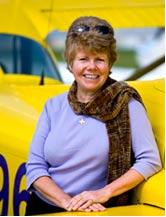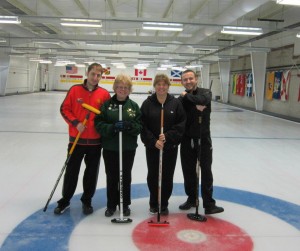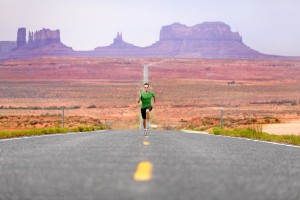 From Layoff to Payoff: Penny Thomas Masters the Barefoot Living Lifestyle
From Layoff to Payoff: Penny Thomas Masters the Barefoot Living Lifestyle
Looking for the inspiration to get started in your writing career? Then look no further than Penny Thomas. Not only has she built up a successful, control-beating copywriting career, she’s also just completed her first novel and is well on her way to leveraging her writing ability to build what she terms her “empire.” As someone who grew up reveling in social events and constant fun (just read her story to see), Penny has clearly figured out how to create a life that mirrors those same elements — and it’s all possible because of her Barefoot Writer status.
You lived in Beirut, Lebanon, for many years and described it as “the best place on Earth.” Why?
Lebanon has the best of mountains, beaches, and climate. The nearest I can describe it is similar to the south of France and Spain and California. My parents took me to Lebanon when I was 4 years old, and we stayed there for 23 years. The Lebanese are very cultured, happy, and friendly ― most speak at least three languages ― Arabic, French, and English. My father worked for the United Nations so our circle of friends included many nationalities. Summer was spent at the beach ― either the sandy beaches to the south of Beirut or the beach clubs built on rocks to the north. For a few weeks of our long (4-month) summer school vacation, we’d cool off in a mountain resort. We swam, sailed, snorkeled, water-skied, and played around on surf boards. Spring and winter, we picnicked in the mountains, explored grotto caves, and skied in the Cedars of Lebanon. You could snow ski in the morning and water ski in the afternoon. Teenage years were a whirl of hanging out at the beach playing backgammon and sunbathing (in itsy-bitsy bikinis!!!). We danced at nightclubs or private parties. In the evenings, you promenaded along Hamra Street (the fashionable main street) until you saw some friends sitting at one of the sidewalk cafes, then you’d join them for a coffee, Coke, or lemonade, talk a while, then get up and move on to the next set of friends sitting in another café. Eventually someone would suggest going to a movie, nightclub, or bowling alley ― and along you’d all go. Beirut was very safe in those days. The public transport system was excellent and we didn’t have to rely on parents driving us around. Our social life was amazing, there were parties of some sort every week ― little kid parties up to very sophisticated black-tie balls ― and I attended every one I could. I guess I was a little spoiled, we had a live-in maid who cooked and cleaned (I cleaned my first bathroom at the ripe old age of 30 … a BIG culture shock!). I hear from a few friends who still live there ― life is not as safe now, but it is still one big social event!
What a vivid description, thank you! Lebanon sounds like it should be on the Top Ten list of everyone who travels. Tell us, where are you from, originally?
I was born in Cardiff, Wales ― both my parents were Welsh. But I only spent three years in Britain ― two in London and one in Cardiff. I’ve lived in Egypt, Portugal, Lebanon, United Arab Emirates, and the United States.
And how did you come to be a copywriter?
My last ‘traditional’ job was in the investment banking industry. After 9/11, the industry went through a lot of challenges ― lots of people got laid off, bonuses were cut, and morale was very low. Around this time, I got the AWAI letter “Can you write a letter like this?” My job involved a lot of writing sales material so I was intrigued, and I signed up for the Accelerated Program for Six-Figure Copywriting. It arrived just before I got laid off (along with 25% of the bank’s staff) at the end of 2002. I scraped together the money to go to Bootcamp 2003, which gave me the boost to really go for copywriting (if you pull up my e-book Layoff to Payoff on AWAI’s site, you’ll see the full story).
Have you ever beaten a control? Can you tell us the story?
Yes. I really lucked out on this one.
I heard through a fellow copywriter who knew I had some knowledge of general aviation (small planes) that Belvoir Media was looking for a copywriter with aviation experience. I sent the Belvoir contact a long letter selling my services. I included my AWAI practice package ― the vitamin letter. Belvoir liked my writing style but misunderstood the male vitamin letter ― they thought it was a real promotion and wanted to know how it mailed (though I had clearly indicated on it that it was an AWAI practice piece).
After a few back and forth emails, Belvoir said, “Every new copywriter has to start somewhere ― we’ll pay you half to write a promotion for Aviation Consumer, and if we like it, we’ll pay you the other half.” I worked really, really hard on this promotion. I pestered my pilot friends for quotes and to verify details. I read about twenty Aviation Consumer magazines and then wrote the copy. I put together a full package ― six-page letter, reply card, lift note, and teaser envelope. Belvoir was very impressed and only changed a few words before they mailed it off. It beat their control by 68%. It is still mailing today.
Wow! Congratulations, that’s quite a success story. The buzz is that you’re also working on a novel —can you tell us about it?
I had three stories lying around unfinished, and last November, during National Novel Writing Month ― NaNoWriMo.org ― I finished one of them. Now all I have to do is edit and sell it! My three novels fall under the General Fiction or Women’s Fiction genres.
Bravo! That’s an accomplishment worth being proud of. Do you have any pre-writing rituals that helped you finish the book, or help with your copywriting?
Not for copywriting. I just sit down and throw some words on the screen. Then I sit at my computer for an hour before I allow myself to get up. Sometimes I write for the whole hour, sometimes I can’t get anything down. But I do not do anything else during that hour ― no checking email, phone, Facebook, or Google ― nothing on the screen but my Word document.
For my creative writing, I meditate before I write. I sit down, close my eyes, and get into the persona of my hero or heroine. This takes about 15 minutes, then I pull up the document, read the last few lines, write down the word count, and get writing. I do not edit as I write. I aim to add between 1,000 and 2,000 words a session (a “session” is not getting up from my computer).
I do have an “end of day” ritual ― I clean off my desk and get everything lined up and ready for the morning. I make a to-do list for the next day and place it on my screen.
That’s excellent advice. Tell us, Penny, how do you take advantage of the freedom that comes with life as a Barefoot Writer?

When I worked in a traditional job, I used up at least three hours a day commuting. Add on another hour for lunch and at least an hour in the morning getting ready for work. It was difficult doing anything productive during the commute ― too many modes of transportation and a lot of noise. So to do seven hours of paid work, I had to add on four hours of non-work (unpaid). Now I can use those four hours to play the piano, go curling, or do anything I like that I didn’t have time for before. I also like the fact that my clients have no idea when or where I work. So if something comes up ― like an all-day curling competition (called a bonspiel) in Maryland or a kayaking trip, I can participate and make up the writing time early in the morning or late at night.
I am moving away from direct-response copywriting for clients and exploring the information publishing field for myself. I’m planning to build my own IP site and subsequently an empire (big dreams!). I couldn’t dream about something like this when I held a traditional, 9-to-5 cubicle job! Being a Barefoot Writer has given me the confidence and skills to go wherever I want.
What’s the most important thing a new writer should do to get started?
WRITE! And Write EVERY DAY.
I’ve seen too many writers get caught up in studying writing, reading up on marketing theory, participating in webinars, conferences, and teleseminars. But they don’t write. If you don’t have anything new to write, then copy out (longhand) passages from the writers you admire and want to emulate. Writing is an art form that gets better with practice. Think about it, you practice painting, playing a musical instrument, sculpting, carving, dancing ― and you do it by repeating over and over again the same brush or chisel strokes. You repeat musical pieces until you can play the tune perfectly. You shuffle and tap the same dance steps over and over again. But for some reason we think we can sit down and write something brilliant with no physical practice. The right side of your brain responds to the direct link between your hand and your brain, and writing out the same paragraph time and time again imprints the rhythm of the words and the sentence structure into your mind so you can recreate something similar later on ― like control-beating sales copy or a prize-winning novel!
Another piece of advice is to attend as many writing conferences as you can ― mix with other writers and learn something new. But don’t neglect writing to attend those conferences!






